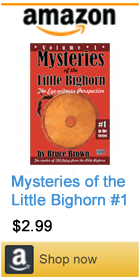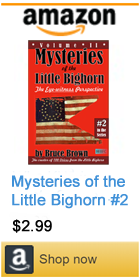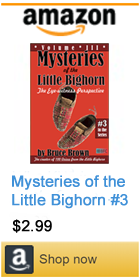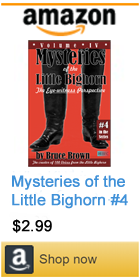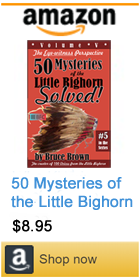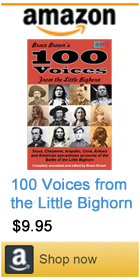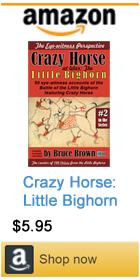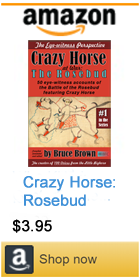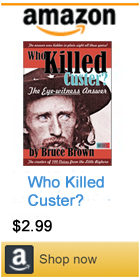|
|||||||
Bruce Brown's 100 Voices... Crow King's Story of the Battle
The first attack was at the camp of the Uncpapas tribe. The shots neither raised nor fell. (Here he indicated that the whites commenced firing at about four hundred yards distance.) The Indians retreated -- at first slowly, to give the women and children. time to go to a place of safety. Other Indians got our horses. By that time we had warriors enough to turn upon the whites and we drove them to the hill, and started back to camp. Then the second band of white warriors came. We did not know who was their chief, but we supposed it was Custer's command. The party commenced firing at long range. (Indicating nearly a mile.) We had then all our warriors and horses. There were eighty warriors in my band. All the Sioux were there from everywhere. We had warriors plenty as the leaves on the trees. Our camp was as long as from the fort to the lower end of our camp here. (More than two and a half miles.) Sitting Bull and Crazy Horse were the great chiefs of the fight. Sitting Bull did not fight himself, but he gave orders. We turned against this second party. The greater portion of our warriors came together in their front and we rushed our horses on them. At the same time warriors rode out on each side of them and circled around them until they were surrounded. When they saw that they were surrounded they dismounted. They tried to hold on to their horses, but as we pressed closer they let go their horses. We crowded them toward our main camp and killed them all. They kept in order and fought like brave warriors as long as they had a man left. Our camp was on Greasy Grass river, (Little Bighorn.) When we charged every chief gave the cry, "Hi-yi-yi." (Here Crow King gave us the cry in a high, prolonged tone.) When this cry is given it is a command to all the warriors to watch the chief, and follow his actions. Then every chief rushed his horse on the white soldiers, and all our warriors did the same, every one whipping another's horse. There was great hurry and confusion in the fight. No one chief was above another in that fight. It was not more than half an hour after the long-haired chief attacked us before he and all his men were dead. Then we went back for the first party. We fired at them until the sun went down. We surrounded them and watched them all night, and at daylight we fought them again. We killed many of them. Then a chief from the Uncpapas called our men off. He told them those men had been punished enough, that they were fighting under orders, that we had killed the great leader and his men in the fight the day before, and we should let the rest go home. Sitting Bull gave this order. He said: "This is not my doings, nor these men's. They are fighting because they were commanded to fight. We have killed their leader. Let them go. I call on the Great Spirit to witness what I say. We did not want to fight. Long Hair sent us word that he was coming to fight us, and we had to defend ourselves and our wives and children." If this command had not been given we could have cut Reno's command to pieces, as we did Custer's. No warrior knew Custer in the fight. We did not know him, dead or alive. When the fight was over the chiefs gave orders to look for the long-haired chief among the dead, but no chief with long hair could be found. (Custer had his hair cut short before starting on this march.) Crow King said that if Reno had held out until Custer came and then fought as Custer did, that they would have whipped the Indians. The Indians would. then have been compelled to divide to protect their women and children, and the whites would have had the advantage. He expressed great admiration for the bravery of Custer and his men, and said that that fight impressed the Indians that'the whites were their superiors and it would be their destruction to keep on fighting them. Both he and Low Dog said that they did not feel that they would be blamed for the Custer fight or its results. It was war; they were attacked; Custer tried to kill them; they killed him. Crow King said he had two brothers killed in the fight; that from thirty to fifty Indians were killed, and a much larger number, who were wounded, died afterward. [Note: according to Richard G. Hardorff, Crow King's two brothers were Swift Bear and White Bull.] The Custer Myth: A Source Book of Custerania, written and compiled by Colonel W.A. Graham, The Stackpole Co., Harrisburg, PA 1953, p 76 - 78
Crow King was a major player among the powerful Hunkpapa Sioux, as the recollections of Gall, Ohiyesa and Mrs. Spotted Horn Bull attest. Crow King was also sometimes known as Medicine Bag That Burns or Burns The Medicine Bag or just plain Medicine Bag -- Wopiye -- as Thunder Bear calls him in his account of the battle. Ohiyesa said Crow King was a leader of the Indians' first counter-charge against Reno, which forced the American troopers to abandon their defensive line in the open and fall back to the timber along the river, where Crazy Horse's first charge of the battle hit Reno's men a few minutes later. |
|||||||



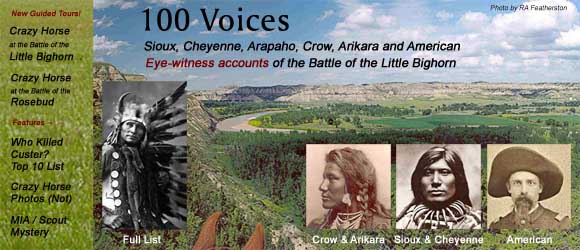
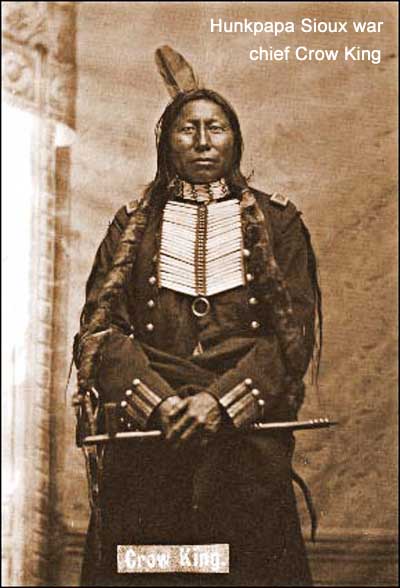 WE WERE in camp and not thinking there was any danger of a battle, although we had heard that the long-haired chief had been sent after us. Some of our runners went back on our trail, for what purpose I do not know. One came back and reported that an army of white soldiers was coming, and he had no more than reported when another runner came in with the same story, and also told us that the command had divided, and that one party was going round to attack us on the opposite side.
WE WERE in camp and not thinking there was any danger of a battle, although we had heard that the long-haired chief had been sent after us. Some of our runners went back on our trail, for what purpose I do not know. One came back and reported that an army of white soldiers was coming, and he had no more than reported when another runner came in with the same story, and also told us that the command had divided, and that one party was going round to attack us on the opposite side.